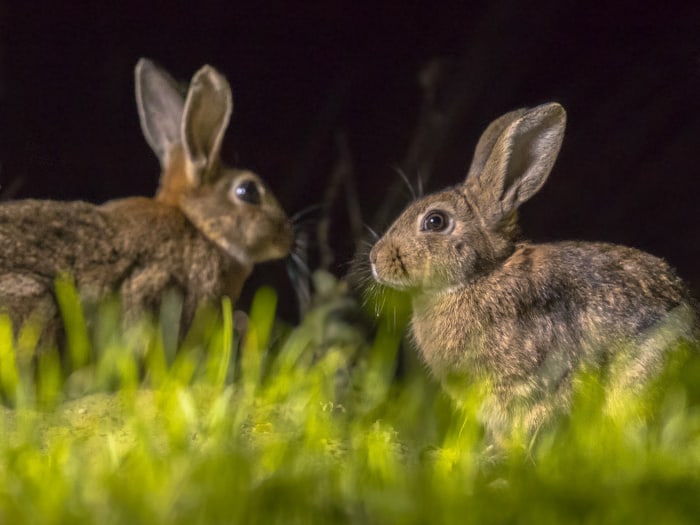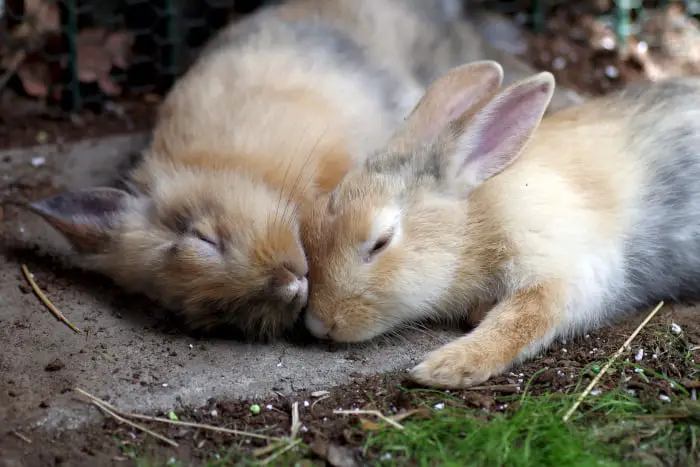
Thus, while the rabbit endogenously is a nocturnally active animal, external noise or scheduled feeding during the light period can turn it to a predominantly diurnal animal. In the absence of any other zeitgeber RF in fact did entrain the free-running circadian rhythms and, thus, is zeitgeber for the circadian oscillator system of the rabbit. When food access was restricted to 4/12 h of the light period, most events of the five behavioral functions were concentrated around the time of restricted food access (RF), the rabbits now being almost exclusively light active. False Rabbits are actually crepuscular, meaning they are most active in the twilight hours of both sunrise and sunset.

In constant light conditions of 7 lux either function free-ran with a circadian period-length greater than 24 h, which, too, is typically in nocturnally active animals. In contrast, in a properly sound-isolated laboratory locomotor activity, hard faeces excretion, food intake, water intake and urine excretion were significantly higher during the dark period of a LD 12:12. When the hours of external noise coincided with the 12 h light period 8/15 rabbits displayed a predominantly diurnal pattern, in 3/15 rabbits no preference existed for light or dark time and 4/15 animals had a typically nocturnal pattern. In an ordinary, non sound-isolated animal room rabbits exhibited elevated locomotor activity, hard faeces excretion, food intake and water intake during elevated external animal-house noise. It appears not even clear, whether the rabbit is a predominantly diurnal, crepuscularly active or nocturnal animal. Their environment must not be restricted overnight, but must be safe so they cannot escape, and any potential predators cannot enter.Although the rabbit is an almost 'classical' laboratory animal, chronobiological research in this species is in its infancy. ConclusionĪlthough rabbits are not nocturnal, they are still fairly active during the night, and perform behaviours which require ample space and enrichment. If your rabbits live close to where you sleep, they may wake you during the night, so this is a consideration you need to think about some rabbits are noisier than others when moving around at night. dusk (as opposed to nocturnal animals, that are active at night, and diurnal animals. When thinking about housing your rabbits indoors Five tips for owners of indoor rabbits can help you decide if this is the right choice for you and your rabbits. How would you feel if someone called your pet bunny crepuscular. They still require a large area to live in at least the same as that recommended for outdoor rabbits, with lots of mental and physical stimulation, a diet mainly hay and grass based, and another neutered rabbit companion.
BUNNIES NOCTURNAL HOW TO
Keeping rabbits indoors, much like dogs and cats are kept, is common, and rabbits can make wonderful household companions, as long as thought is given to how to care for them correctly. Indoor rabbits at nightĭepending upon where your rabbits live in your house, their night-time antics may keep you awake! This behaviour shows the rabbits are happy and feel safe in their environment and is their way of letting off steam.
BUNNIES NOCTURNAL FULL
Sitting and grooming a companion rabbit, and making frequent trips to their litter trays, are other activities that they perform at night.ĭuring their most active time of the day, at dawn and dusk, they will often run, skip and jump around and perform ‘binky’ behaviour, whereby they run at full speed, leaping and twisting high in the air. They will eat frequently, and must have constant access to fresh, clean hay which is scattered around their environment. This is totally normal and a sign they feel safe and happy.


Rabbits will often sleep on their side, lying flat out when sleeping, which can worry some owners. Having a companion rabbit means that whilst one rabbit sleeps, the other can be on the lookout for potential dangers. This is a common sleeping pattern for prey animals, as when asleep they are at greater risk from a predator attack. If you have ever watched your rabbits at night, you will have seen that they spend a large amount of time sleeping, involving short naps, rather than long periods of time spent sleeping. (Image credit: Getty) What do rabbits do at night?


 0 kommentar(er)
0 kommentar(er)
